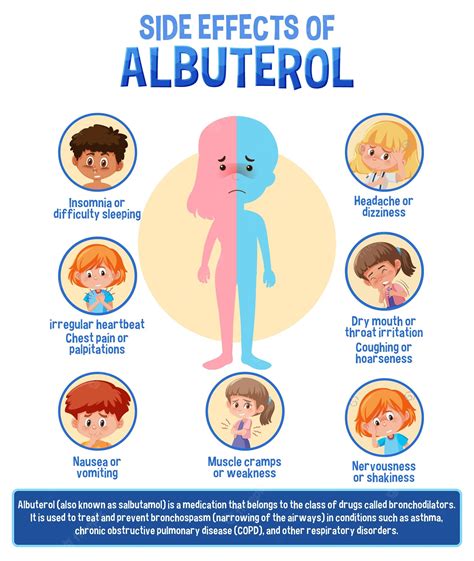Intro
Discover what Albuterol is, a bronchodilator medication, and learn about its uses, side effects, and interactions, including asthma treatment and COPD management, to understand its benefits and risks.
Albuterol is a medication that plays a crucial role in managing asthma and other respiratory conditions. It is a bronchodilator, which means it helps to open up the airways in the lungs, making it easier to breathe. Albuterol is commonly used to treat asthma, chronic obstructive pulmonary disease (COPD), and other breathing disorders. It is available in various forms, including inhalers, nebulizers, and tablets. The medication works by relaxing the muscles in the airways, which helps to increase airflow and reduce symptoms such as wheezing, coughing, and shortness of breath.
The importance of albuterol cannot be overstated, as it has been a lifesaver for many people who suffer from respiratory conditions. According to the Asthma and Allergy Foundation of America, asthma affects over 25 million people in the United States alone, and albuterol is one of the most commonly prescribed medications for managing the condition. The medication has been shown to be effective in reducing symptoms and improving lung function, making it an essential tool for people with asthma and other respiratory conditions.
As with any medication, it is essential to understand how albuterol works, its benefits, and its potential side effects. In this article, we will delve into the world of albuterol, exploring its mechanisms, uses, and potential risks. We will also discuss the different types of albuterol, including inhalers and nebulizers, and provide tips for using the medication effectively. Whether you are a healthcare professional or someone who suffers from a respiratory condition, this article aims to provide you with a comprehensive understanding of albuterol and its role in managing breathing disorders.
How Albuterol Works

The medication is available in various forms, including inhalers, nebulizers, and tablets. Inhalers are the most common form of albuterol, and they work by delivering a measured dose of the medication directly to the lungs. Nebulizers, on the other hand, use a compressor to turn the medication into a fine mist that can be inhaled over a period of several minutes. Tablets are less common, but they can be used to treat mild to moderate asthma symptoms.
Benefits of Albuterol
The benefits of albuterol are numerous, and they include: * Rapid relief from symptoms such as wheezing, coughing, and shortness of breath * Improved lung function, making it easier to breathe * Reduced inflammation in the airways, which can contribute to symptoms * Increased airflow, making it easier to perform daily activities * Effective in managing asthma and other respiratory conditionsTypes of Albuterol

Each type of albuterol has its own unique characteristics, and they may be prescribed for different purposes. For example, albuterol sulfate inhalation aerosol is commonly used to treat acute asthma symptoms, while albuterol sulfate tablets may be used to treat mild to moderate asthma symptoms.
Using Albuterol Effectively
To use albuterol effectively, it is essential to follow the instructions provided by your healthcare provider. Here are some tips for using albuterol: * Use the medication as directed, and do not exceed the recommended dose * Shake the inhaler well before use * Inhale the medication slowly and deeply, holding your breath for 10 seconds * Use a spacer or valved holding chamber to help deliver the medication to the lungs * Clean and maintain the inhaler regularly to ensure proper functionSide Effects of Albuterol

In rare cases, albuterol can cause more serious side effects, such as:
- Allergic reactions
- Anaphylaxis
- Cardiac arrhythmias
- Hypokalemia (low potassium levels)
If you experience any side effects while using albuterol, it is essential to contact your healthcare provider immediately.
Interactions with Other Medications
Albuterol can interact with other medications, including: * Beta blockers * Diuretics * Monoamine oxidase inhibitors (MAOIs) * Tricyclic antidepressantsIt is essential to inform your healthcare provider about all the medications you are taking, including prescription and over-the-counter medications, to avoid potential interactions.
Albuterol and Pregnancy

However, it is essential to note that albuterol can cause side effects, such as rapid heartbeat and tremors, which can be concerning during pregnancy. If you are pregnant and using albuterol, it is essential to monitor your symptoms and side effects closely and report any concerns to your healthcare provider.
Albuterol and Breastfeeding
Albuterol is generally considered safe to use during breastfeeding, but it is essential to use the medication under the guidance of a healthcare provider. The medication can help to manage asthma symptoms during breastfeeding, which is essential for the health of both the mother and the baby.However, it is essential to note that albuterol can pass into breast milk, which can cause side effects in the baby. If you are breastfeeding and using albuterol, it is essential to monitor your symptoms and side effects closely and report any concerns to your healthcare provider.
Conclusion and Final Thoughts

We hope this article has provided you with a comprehensive understanding of albuterol and its role in managing breathing disorders. If you have any questions or concerns about albuterol or asthma, please do not hesitate to comment below or share this article with others. Remember, managing asthma and other respiratory conditions requires a comprehensive approach, including medication, lifestyle changes, and regular monitoring.
What is albuterol used for?
+Albuterol is used to treat asthma, chronic obstructive pulmonary disease (COPD), and other breathing disorders.
How does albuterol work?
+Albuterol works by stimulating the beta-2 receptors in the lungs, which helps to relax the muscles in the airways, increasing airflow and reducing inflammation.
What are the side effects of albuterol?
+Common side effects of albuterol include headache, dizziness, nausea and vomiting, rapid heartbeat, and tremors. In rare cases, albuterol can cause more serious side effects, such as allergic reactions, anaphylaxis, cardiac arrhythmias, and hypokalemia.
